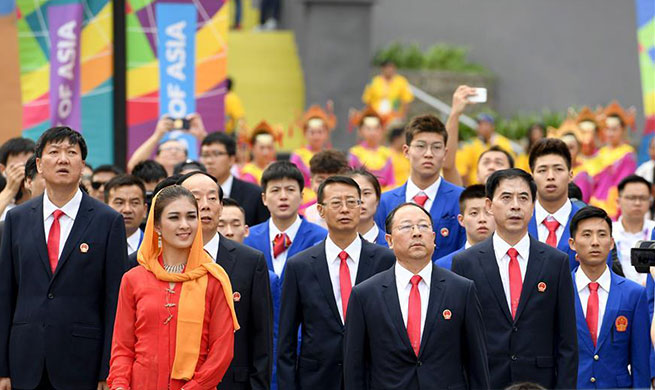BERLIN, Aug. 16 (Xinhua) -- German interior authorities faced a wave of criticism from opposition and judicial representatives on Thursday after the Muenster Higher Administrative Court (OVG) ruled that the deportation of Sami A. was unlawful and would hence have to be reversed.
Several voices called for the resignation of North Rhine-Westphalian integration minister Joachim Stamp. Earlier, Stamp had defended the removal of Sami A. as being legally sound and said he would take "complete personal responsibility" for the decision.
"I expect (Stamp) to take the necessary steps now following his verbal statement," SPD regional faction leader Thomas Kutschaty said.
According to Kutschaty, the time had come for the ruling Christian Democratic Union (CDU) and Free Democratic Party (FDP) coalition to pay the price for gross misconduct in the deportation of Sami A. "A government that does not abide by the law has lost more than its moral authority," he added.
Similarly, Green party (Gruene) legal spokesperson Stefan Engstfeld urged Stamp to "draw the inevitable conclusion" after the Muenster OVG found that his office had "deceived and ignored" independent judicial authorities.
An alleged former bodyguard of Al Qaeda leader Osama bin Laden, Sami A. was deported to Tunisia on July 13, one day after the Gelsenkirchen administrative court overturned the deportation decision on the grounds that the terror suspect was at risk of being tortured in his native country. The Muenster OVG confirmed the initial decision by the Gelsenkirchen court on Wednesday night, rejecting an appeal filed by the City of Bochum and state of North Rhine-Westphalia to prevent Sami A.'s return to Germany.
In their verdict, the judges launched a searing attack on interior authorities ranging from regional migration officers to Interior Minister Horst Seehofer for attempting to bypass the rule of law. The OVG found that information had been withheld from courts and that Stamp refused to halt the deportation in spite of being aware that it was "obviously unlawful".
Stamp himself reacted to the news with shock. "The court decision leaves us perplexed," he said. The FDP politician vowed to respond to the accusation by judges of having relied on "half-truths" to achieve an illicit political objective with more transparency.
Writing in WELT, FDP deputy faction leader Wolfgang Kubicki turned against Stamp, his party colleague, and warned that authorities could not "turn the rule of law on and off as they pleased."
Kubicki also lashed out at Seehofer, saying it was an "unbelievable failure" on Seehofer's behalf to have obtained a diplomatic note from the Tunisian government to guarantee Sami A. would not be tortured there as demanded by the Gelsenkirchen court in its first verdict.
Speaking to the German press agency (dpa), Muenster OVG president Ricarda Brandt echoed Kubicki's words, saying: "The case of Sami A. raises questions about democracy and the rule of law, especially with regards to the division of powers and effective legal protection".
Brandt warned her colleagues in the judiciary to treat assurances made by authorities with greater caution in the future. She lamented that Sami A.'s case had caused damage to the traditional "relationship of trust" between the judicial, legislative, and executive branches of government in Germany.
Responding to such criticism, North Rhine-Westphalian interior minister Herbert Reul struck a defiant stance on Thursday. "The independence of courts is valuable. Nevertheless, judges should always ensure that their decisions also reflect the sense of justice of the population," he told Rheinische Post newspaper.
German interior authorities still have the possibility to lodge a final appeal at the Federal Constitutional Court, although this step would not in itself invalidate the order by the Muenster OVG to bring Sami. A back to Germany as soon as possible.
However, it remained unclear on Thursday whether Tunisia will actually allow the suspect to leave the country again. Earlier, the local judiciary issued a statement noting that it reserved to right to reach its own judgement on how to proceed with the Tunisian national.













